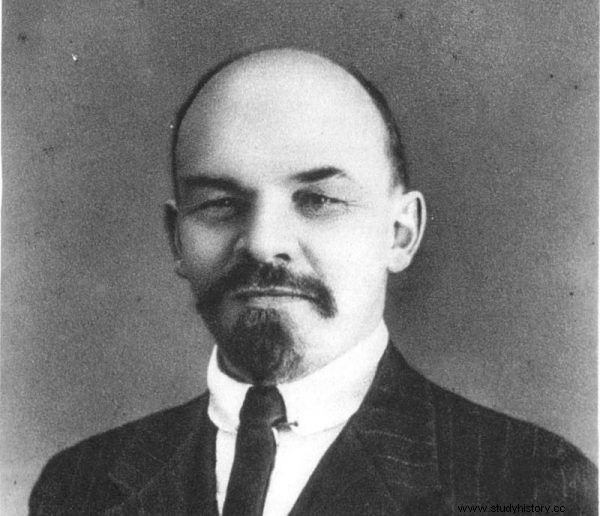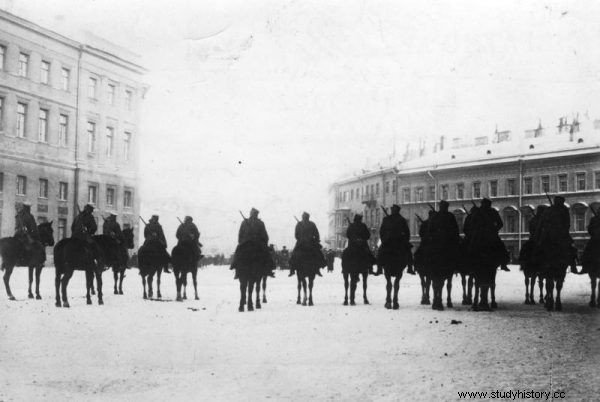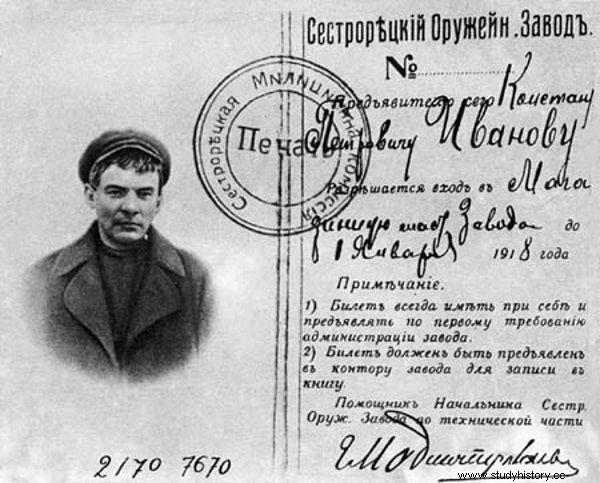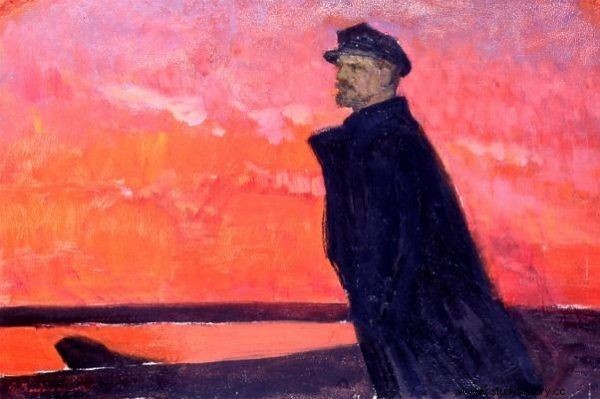Fear is a very human feeling, but many consider it a sign of weakness. Political leaders especially want to prove to everyone that fear is a foreign concept to them. Just what if the reality is exactly the opposite? Everything indicates that this is what happened to the father of the Russian revolution - Vladimir Lenin ...
It seems impossible that the leader of the Bolsheviks, the leader of the October Revolution and one of the founders of the totalitarian communist system felt fear. And yet.
There were at least a few events in the life of Vladimir Ilyich Ulyanov that put his courage into question. This was also noticed by his contemporaries, who sometimes even accused him of cowardice. Is it right?
"Do not mourn the dead"
The accusation of excessive timidity was quite popular among radicals. Lenin himself generously bestowed him on many of his political predecessors. "The bourgeoisie (...) will always be cowards and traitors" - he would say many times. After the split that took place among the communists in 1903, he also judged the moderate Mensheviks equally harshly. Because, unlike the violent Bolsheviks, they rejected the revolutionary scenario and refused to shed blood as ideals, he considered them timid infidel.
The pillory of the initiator of the Russian breakthrough also included those who believed in the need for sudden changes, but did not think that single, small protests could make a difference. Meanwhile, as Victor Sebestyen writes in his book "Lenin. The Dictator " , as early as 1905, the future Soviet tsar argued that uprisings and revolutions must take place even when they do not end in victory. Anyone who thought otherwise was considered a coward by Ilyich.

Lenin accused almost every opponent of his cowardice.
His own steadfastness is somewhat undermined by the fact that he called for a fight against the Russian regime… sitting quietly in Geneva, Switzerland. He prudently did not leave Western Europe, leaving suicide missions in the service of the Cause to his associates. At the same time, avoiding direct involvement by no means prevented him from expressing extreme views.
One such case is described in the biography "Lenin. The Dictator " Victor Sebestyen. In 1905, there were riots among Moscow workers. Their protests were bloody silenced by the army, which the commander accepted without much emotion:
[Military] o they fought protesters in a working-class neighborhood of the city, killing dozens of them. Field guns shelled the area for three days, killing hundreds of people, including 86 children. Lenin replied not to mourn the dead. He stated that it was important that the revolutionaries fought in the streets and defeat would teach them to hate their enemies.

No wonder that such an attitude of the leader caused dissatisfaction even among his closest companions. Lenin's decisions and orders, given from a safe distance, seemed cynical and sometimes even absurd. After all, he was well aware that the speeches he encouraged had no chance of success.
The image of the first of the revolutionaries suffered greatly from the fact that in the years when there were riots with the authorities in Russia, he himself traveled from Geneva to Paris, London and Krakow without risking his life. The more that once he was in Russia, he was also not eager to participate in demonstrations during which riots could occur.
And when, despite his avoidance, he suddenly found himself in the center of events… he simply embarrassed himself. More than once, his companions rubbed their eyes with amazement at the behavior of their mentor. And they whispered boldly among themselves that maybe he was simply the most ordinary coward.

Workers' demonstrations in Russia often ended in blood. No wonder Lenin preferred not to participate in them…
Compromise the chief
Indeed, Lenin was frightfully afraid of being arrested. Being in exile, he did everything not to return to Russia. If he made his way to St. Petersburg, of course in disguise and under a false name, he paid great attention to covering up his tracks and keeping his anonymity. He always camouflaged himself when he traveled - put on wigs, hats, even pretended to be a Lutheran pastor once!
This was also the case when in 1906 he found himself again - of course incognito - in his homeland. In May, he gave his first public speech, full of militant attacks against the bourgeoisie. At that time, about three thousand people of revolution supporters listened to him. Meanwhile, as his wife, Nadezhda Krupskaya, recalls, shortly before the meeting began, the future dictator was “terribly pale. All the blood drained from his face. ”
Although the speaker was under an assumed name as Karpov, the audience soon realized that Vladimir Lenin himself was standing in front of them. The hero of the event was greatly scared by the recognition. Immediately after his speech, he fled to Finland in fear, fearing arrest by the tsarist police.

photo:public domain Lenin has traveled more than once under an assumed name.
The Bolshevik leader showed even greater timidity during the demonstration. During one of them, held in St. Petersburg, his companions felt embarrassed. Victor Sebestyen, author of the book “Lenin. The Dictator " He got to the account of one of the protesters, Tatiana Aleksińska. Her story about the behavior of the leader is shocking:
I'd rather not mention this meeting. Lenin, adored by all left-wing social democrats, seemed to me a legendary hero. (…) Without getting to know him closely, we imagined him as a fearless revolutionary without a blemish. Not only his appearance made an unpleasant impression on me (...).
But this is about its behavior during the demonstration that happened later. Someone, seeing the cavalry attacking the crowd, shouted:"Cossacks!", Lenin was the first to run away. He jumped over the barrier. He lost his bowler hat, revealing a naked skull, sweaty and glistening in the sunlight. He fell, got up, and kept on running. (...) I had a strange feeling. I realized that there was nothing else to do but save my own skin. And yet… he was the leader.

Fear has big eyes
Despite this type of behavior, not all Bolsheviks saw Lenin as a coward. His rare participation in demonstrations had some justification. Namely, the leadership of the party was of the opinion that Ilyich was too valuable to the revolution to risk his life in riots. He should not be killed by bullets in clashes with the tsarist authorities or be arrested.
This belief was shared by ... the future Russian leader himself. As one of his associates, Nikolai Valentinov, emphasized, “[he] would never have gone to the street to fight on the barricade or stand in the line of fire. Not him, but other, more modest people were to do it ". So maybe he was not a coward, but only a megalomaniac?
What can be said with certainty is that Lenin himself has often exaggerated the danger that loomed over him. He became so paranoid because of this that some communists saw him as a "man without personal courage" .

Lenin himself rarely got involved in the action. He also watched the "red dawn" rather from a distance.
A leading revolutionist exercised extreme caution even abroad. He avoided threats like fire. When, during one of the meetings of Bolshevik activists in exile, there were only rumors of exposure, he immediately fled.
Taking care of one's own life accompanied the first Soviet dictator also during the revolution and after its victory. Others, however, he sent to death with a light hand. He was not impressed by the victims of communism, the civil war in Russia and the Polish-Bolshevik war. "They hesitate, they are afraid to fight for power!" - accused all those who were not convinced whether blood should be shed for communism. And he cried "bravely" that you have to fight. After all, he didn't risk it himself…
You must have this biography of the leader of the October revolution on your shelf:

